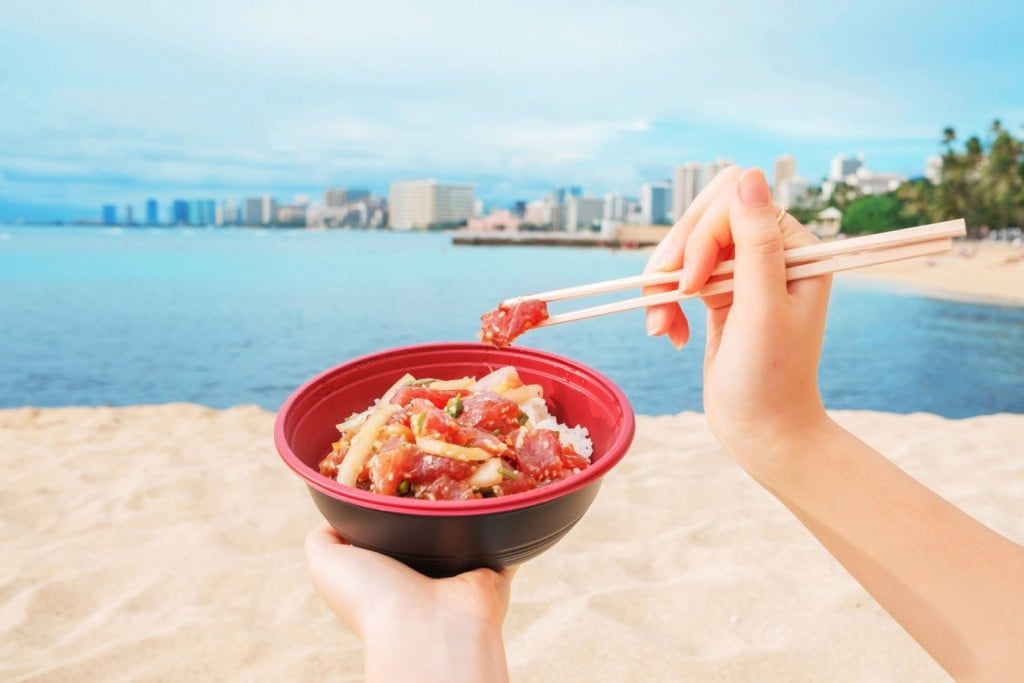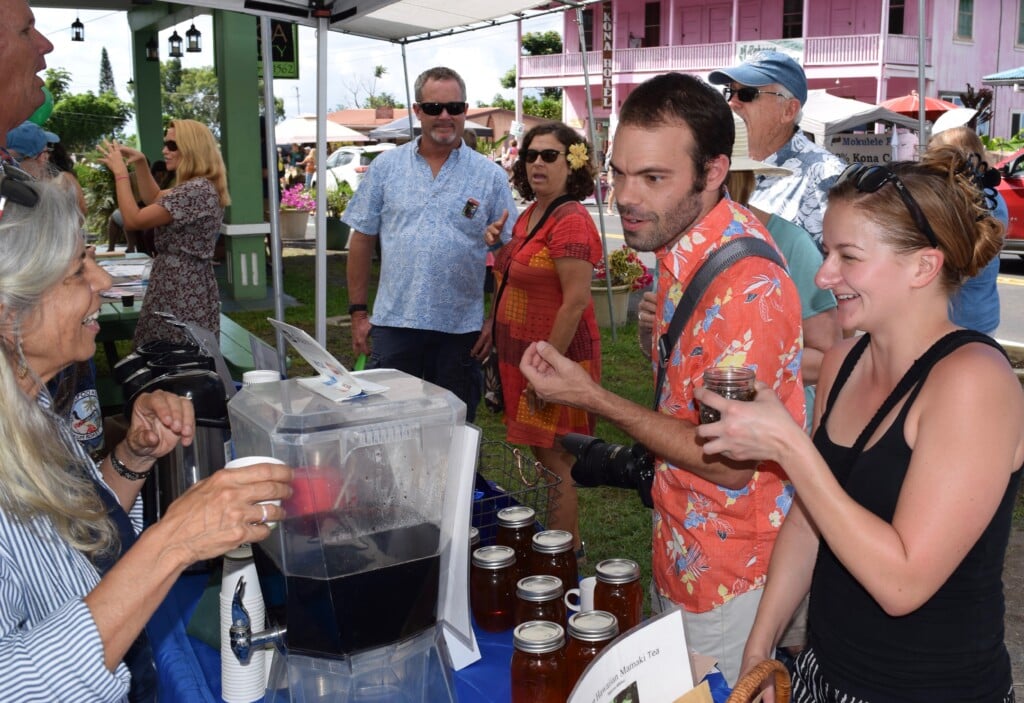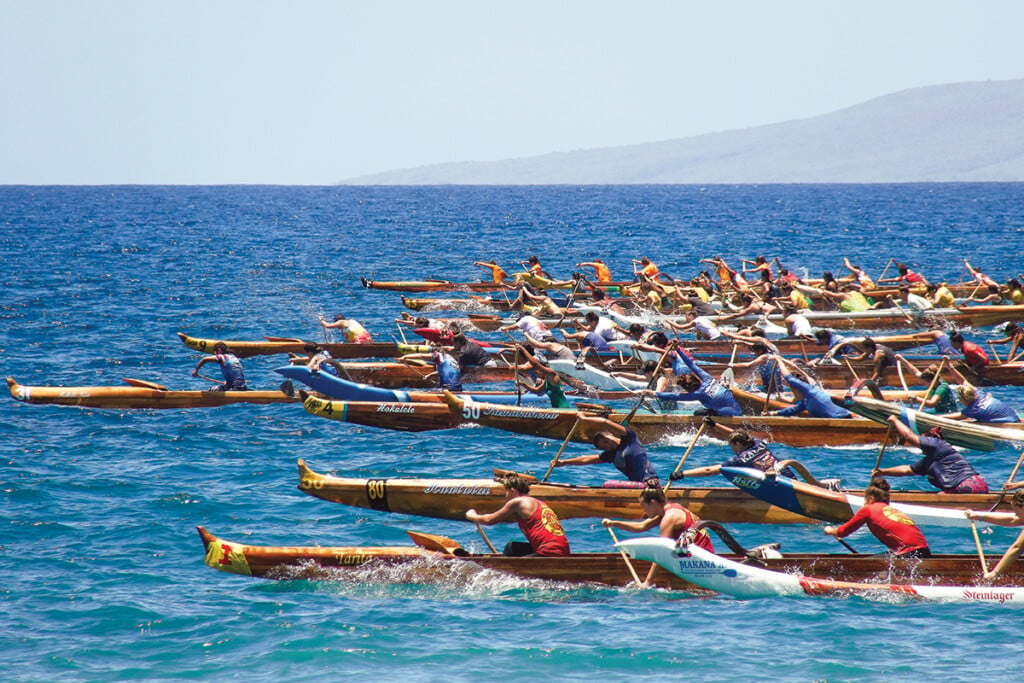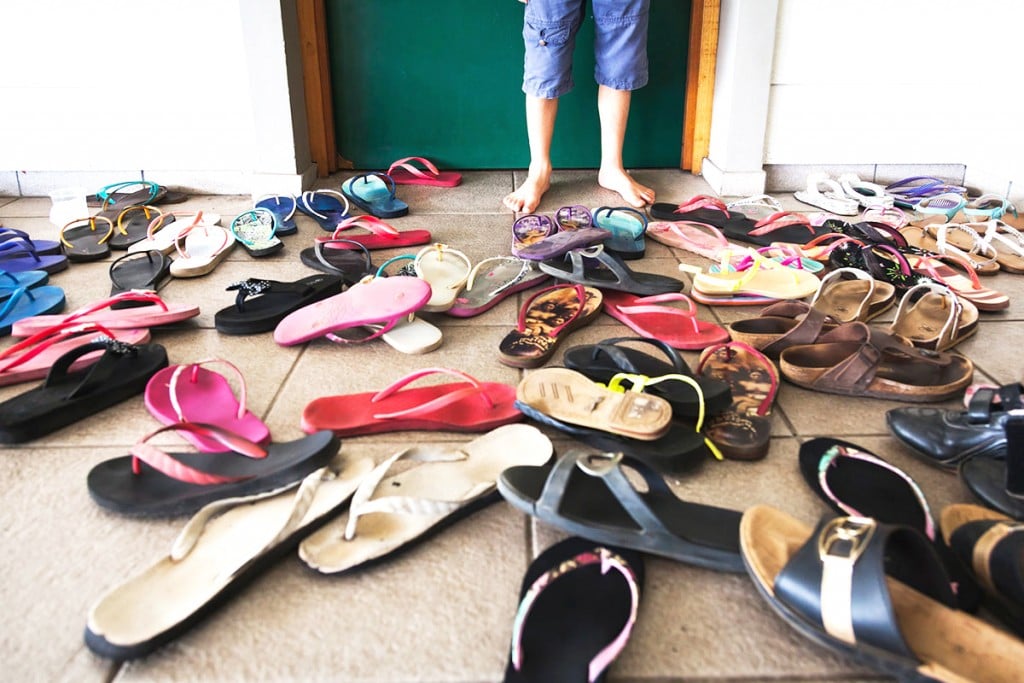44 Hawaiian and Pidgin Phrases Every Visitor Needs to Know
Here’s a pocketbook dictionary on some of the most useful, and common, Pidgin and Hawaiian words used in Hawaiʻi.

This article was updated with a few new pidgin phrases. The original piece was uploaded on Sep. 9, 2019.
EDITOR’S NOTE: For the sake of clarity, we will be using Hawaiian diacritics, such as okina (ʻ) and kahako (āēīūō) in this article.
If you’re coming to Hawaiʻi for the first time, prepare to be blasted with phrases and words that might not make any sense to you. Hawaiian Pidgin English, known locally as Pidgin, is spoken by many Hawaiʻi residents, and words and phrases from ʻōlelo Hawaiʻi (Hawaiian language) has also become the norm here in the Islands. So, if you’re worried about not knowing the lingo, here’s an alphabetical list of 38 Pidgin and Hawaiian phrases that will help you not get lost in translation.
B-52 Bombah
Roaches, specifically the big kind that can fly.
“Grab my slippah, I gotta kill one B-52 bombah!”
Beef
Surprisingly, not the meat. In context, asking someone if they like beef is an invitation to a fight or alercation.
“What, like beef?”
Bumbai (bum-bye)
This Pidgin phrase features multiple definitions, like “otherwise,” “or else,” “later,” “later on.”
“Brah, you better not stay up late bumbai you’ll miss your alarm.”
Brah
A casual way to refer to somebody, short for brother or braddah.
“Brah, you get the time?
Broke Da Mouth
If you’re eating delicious food, you can exclaim just how good it by saying that it has “broke da mouth.”
“Ho, this saimin so ʻono, it broke da mouth brah.”
Cherreh
To compliment something or denote that it is good.
“My auntie’s lau lau was so cherreh last night.”
Chicken Skin
Goosebumps.
“My cat was staring at a corner in my room and I got all chicken skin.”
Choke
A lot, plenty.
“You ever clean your room brah? Get choke trash in here.”
Cockroach
To steal, stealing.
“I was at Sunset Beach last night and someone wen cockroach my wallet!”
Da Kine
When referring to literally anything you can’t remember the name of.
“Remember when da kine came over? She forgot her da kine on the couch.”
Fut (fu-t)
Fart, to fart.
“Oof, it stinks in here! Ho cousin, did you fut?”
Green Bottle
Heineken, which is a favorite beer amongst locals.
“Go 7-11 Alika and grab us some green bottles.”
Grinds/Grindz
Food or a meal. Often spelled with a “z” instead of an “s”.
“Hiking Koko Head got me all tired, like go get some grinds from Zippys?”
Hana Hou (ha-nuh-ho)
A phrase taken from the Hawaiian language, translated it means “to do again.” Often shouted by audience members at the end of a live musical performance when trying to encourage an encore.
“That band was so good! Hana hou! Hana hou! Hana hou!”
Hamajang (ha-muh-jang)
Something that is messed up, crooked, disorderly or needs to be fixed.
“I wen sleep with my hair wet and now it’s all hamajang.”
Holo Holo
To cruise around, wander without direction. In ʻōlelo Hawaiʻi, “holoholo” does not have a space and one definition is “to go out for pleasure, stroll or promenade.”
“Hey Noah, what you doing on Saturday? We should go holo holo around Waikīkī.”
Howzit
The combination of the words “how,” “is” and “it.”
“Howzit uncle?
Irraz (ee-ruz)
What you call someone or something that is being irritating or a nuisance.
“Ugh, taking out the trash is so irraz.”
Kamaʻāina (ka-muh-ai-nah)
Although the Hawaiian definition of the word means native-born, many use the word kamaʻāina to describe individuals who have been living in Hawaiʻi for an extensive period of time. Many stores and restaurants provide kamaʻāina discounts to local residents who have a state-issued ID.
“My uncle Lester has been living on Maui since the 70’s. He’s pretty much one kamaʻāina.”
Kanak Attack (ku-nack-uh-tack)
The inevitable sleepiness that washes over you after you’ve eaten a large quantity of food.
“Oh, brah, I ate too many leftovers and now I get one kanak attack. I going take one nap.”
Kāne (kah-nay)
In Hawaiian language, kāne means male, husband, man or masculinity.
“Make sure you go into the kane bathroom Rodger, and not the wahine one.
Kapu (kah-poo)
ʻŌlelo Hawaiʻi for taboo, prohibited or sacred.
“You can’t go past that fence Lani, it’s kapu.”
Keiki (kay-key)
Translated from the Hawaiian language, keiki refers to a child, or children.
“Have you been to Aulani? They’ve got great keiki services.”
L’dat (luh-dat)
Fusion of the words “like” and “that”.
“Sometimes it just be l’dat.”
Mahalo (ma-ha-low)
A Hawaiian word for thanks, gratitude or to thank.
“Mahalo for the mangos!”
Makai (muh-kahy)
Hawaiian phrase for oceanside, or near the ocean. Used in collaboration with the word “mauka” (see below) to give directions.
“Where did I park? I swear I was on the makai side of the parking lot.”
Mauka (mah-oo-kah)
ʻŌlelo Hawaiʻi phrase for inland, or toward the mountains. Often used to give directions or to locate where someone or something is.
“I’ll pick you up on the mauka side of Ala Moana, okay?”
ʻOno (oh-no)
Hawaiian word for tasty, delicious and savory.
“Brah, the plate lunches from Gochi Grill are so ʻono.”
ʻOhana (oh-ha-nah)
ʻOhana is the Hawaiian word for family, and family means nobody gets left behind, or forgotten. Movie references aside, ʻohana isn’t strictly blood-related, and can be used to describe a close group of friends, or employees of the same company.
“I saw Lilo and Stitch with my work ʻohana last friday, then had dinner with my actual ʻohana.”
Pakalōlō (pah-kah-low-low)
Marijuana, pot, devil’s lettuce, herb, the green. Actually a combination of two Hawaiian words, “paka,” which means tobacco, and “lolo,” which can be translated to mean numbing, or paralyzing. So the literal translation would be numbing tabacco.
“My friend offered me some pakalōlō last weekend and I said ‘no way man, winners don’t do drugs.’”
Pau (pow)
ʻŌlelo Hawaiʻi phrase used when you’ve completed something, or a task is done.
“Kai let’s go get some beers. I’m all pau with work.”
Poke (poh-kay)
The Hawaiian word, which literally means to slice, or cut, wood or fish into crosswise pieces, is often used to describe sliced, or cubed, fish that is ready for consumption. A poke bowl, for example, will have cubes of raw fish sitting atop rice and covered in sauces and seasonings.
“Hey, let’s stop at Foodland. I like get one poke bowl.”
Pūpū
Appetizer, or small dishes.
“Ho the pūpū at your mom’s potluck was so ʻono.”
Rajah (rah-jah)
The Pidgin version of the word rodger, something you say when you are in agreement. May or may not be accompanied with a “dat” (that).
“You like go Mākena Beach tomorrow? Rajah dat.”
Scosh (su-ko-sh)
Small, in size or in quantity. A contracted form of the Japanese word “sukoshi,” which shares the same definition.
“Can I have a little bit of your poke? Scosh, scosh.”
Scrap
To fight, or want to fight.
“Brah the unko like scrap me just because I dropped in on him at Queens.”
Shishi
Urine, or the act of urination. Often a phrase used with keiki.
“I told you Kainoa, you should have gone shishi before we left the house.”
Shoots
Synonymous with rajah, shoots is often used as a way of agreeing with something, or as a replacement for the word “okay.”
“You want to go surf Canoes on Sunday? Shoots!”
Slippahs
Slippers, flip-flops, sandals.
“Oh we’re going somewhere nice? Hold up, let me put on my leather slippahs.”
Small Kid Time
A term used to reference your childhood, or when you were younger.
“Remember that crack seed shop from small kid time? They just wen close down last week.”
Tantaran
To act in a boisterous or showy manner.
“Don’t act all tantaran, this isn’t a beauty contest.”
Tanks
Thanks, but without the “h”.
“Oh, you got me one manapua? Tanks.”
Talk Story
Catching up, telling stories or gossiping with friends or acquaintances. Talking story is often much longer than a normal conversation, and a whole night can be spent doing it.
“Nah, we nevah did much, just drank some beers and talk story all night.”
Wahine (wa-hee-nay)
Hawaiian word for female, woman, wife or femininity.
“Rodger what did I say? You go to the kāne bathroom, not the wahine one!”


